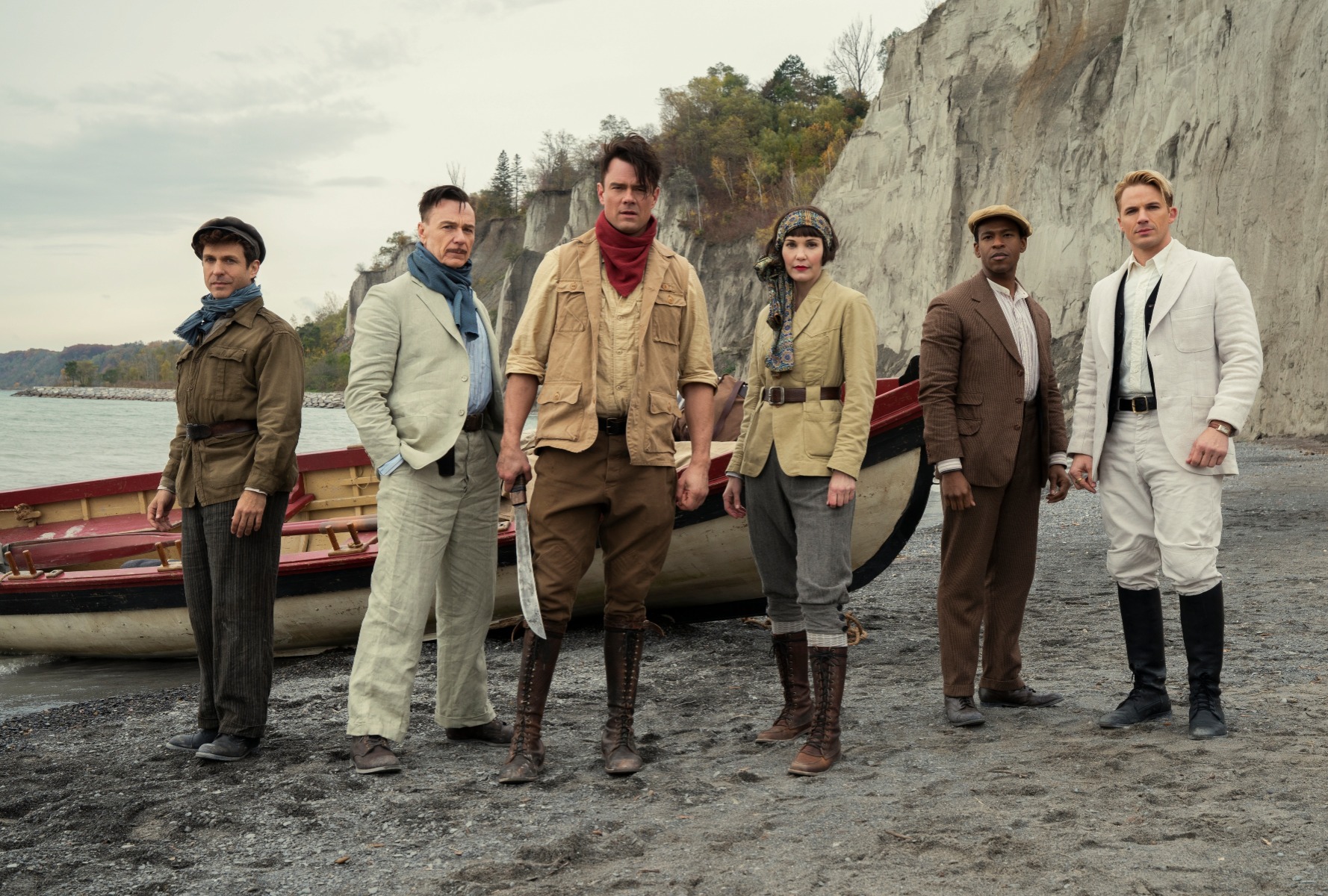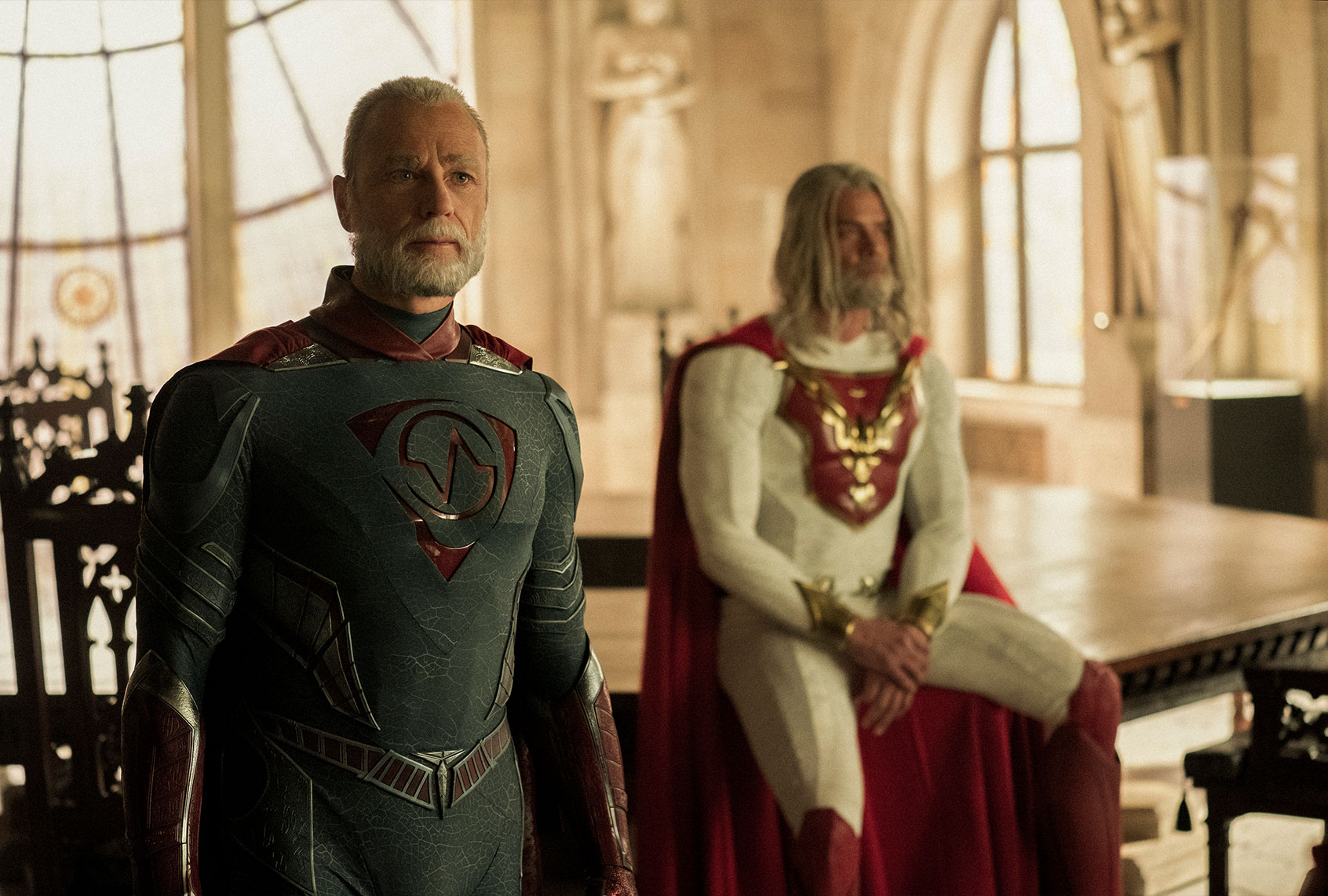“People will say this is a Trump allegory,” says comic book writer Mark Millar about the rise of a manipulative, power-mad villain in his new Netflix series “Jupiter’s Legacy.” “But that was actually just coincidence.”
Millar is behind some of the most acclaimed superhero stories that have hit the big screen, from “Captain America: Civil War” to “Logan.” He’s made a name with his independent Millarworld titles as well, including the “Kick-Ass,” “Kingsman,” and “Wanted” films.
For his first collaboration with Netflix – which had acquired Millarworld – Millar settled on “Jupiter’s Legacy,” a title he had originally published in 2013. The first season traces the origins of a superhero group called the Union in 1929 and how those surviving members are struggling in the present day with their offspring abiding by a strict set of guidelines. To prevent the Union from abusing their superpowers, leader Sheldon Sampson known as The Utopian (Josh Duhamel), established the Code: they would neither govern nor use their powers to kill – not even the bad guys.
Apparently, this Code had gone uncontested for 90 years except for one defector: Sheldon’s best friend George Hutchence, aka Skyfox (Matt Lanter), who had left the Union for whereabouts unknown. Over the course of the season’s eight episodes, however, signs emerge that Skyfox is behind a number of attacks that tests the Union, even causing one to break the Code, all while other members perish trying to abide by it.
In the end, it’s revealed to the audience that the true evil mastermind has been Sheldon’s brother Walter, aka Brainwave (Ben Daniels), who not only felt hamstrung by the Code for decades, but has even killed his own daughter in order to continue his plan of driving a wedge between The Utopian and the new generation of superheroes.
“The idea of it was, just because you’re powerful doesn’t mean that you should step in . . . it’s that idea of the role of having a superpower and what that means,” Millar told Salon in an interview. “It was timely in 2008, when I first started putting the notes together, because we just had the financial crash. It’s actually quite perennial, though. The mistake we make as human beings is to think that we’ve solved all the problems. What happens is the problems just keep coming back.”
Millar cites Tony Benn, a British politician who believed the world’s problems could be fought, but would always return in some form.
“This just goes on forever. There has to be people coming up behind you who continue to fight; nothing ends,” said Millar. “And I think history is exactly like that. The 90-year cycle of history, which I covered in the story, which was 1929 looking a hell of a lot like 2008. And now we’re coming out of a massive financial crash, and weirdly, we’ve had a pandemic as well, not unlike the 1918-1920 pandemic.
“But then there’s also the rise of nationalism around the world because that was starting to pop up as a result of the financial crash in 2008. People turned on the establishment, turned on the status quo, and started to look for extreme solutions to everything. In America that became Trump, in Scotland it was the SNP, in England it was UKIP, in France it’s Le Pen, it’s Bolsonaro in South America, Italy’s got Salvini.
“So ‘Jupiter’s Legacy’ is about that. It’s about the idea that historically what happens after bad times is people turn to autocrats, and that’s what Season 2 would involve, if we’re lucky enough to have a Season 2.”
Continue reading Salon’s interview with Millar, who addresses creating the ultimate supervillain, why there are so many super-powered people, and the series’ big question: Who or what is behind granting the powers in the first place?
The following has been lightly edited for length and clarity.
The final battle we see turns out to be a misdirect. What went into that scene so that the audience is not tipped off right away who’s the actual mastermind?
We have what looks like the ultimate confrontation going on between Skyfox and Brainwave, but in reality, we know that’s a construct. That whole thing was a trap. The big villain is who we have been looking at all along, and yet from Episode 1 it’s so obvious, but you drop Skyfox in enough all the way through the season.
That takes us up to roughly Issue 2 of the comic where you realize Walter was going after his brother, he’s gonna take down his own family, and he’s already killed his daughter. You realize he’s capable of anything. But why I like Walter though is at the same time as he’s doing it for actually quite ethical reasons. He knows there’s going to be a lot of bloodshed, but ultimately, it’s because [of the Code] these guys let World War II happen, they led the concentration camps happen, they let people starve in Africa, the bombs dropped on Nagasaki and Hiroshima. They should have been stepping in potentially.
I think Walter hopefully is going to go down as one of those great television bad guys because he’s kinda charismatic and correct sometimes. You can see why the younger characters, the Millennial characters are going to fall in behind them. If Superman existed in real life, you’d be like, why are you over there fighting that robot? Why don’t you go and help some starving people in Africa? That’s the reality of the situation. So you can see why people would be a little ticked off with somebody who’s as powerful as the Utopian not acting.
You mentioned you’d be lucky to have a second season. I know the comics are still ongoing, more are coming in June. When you first thought of adapting this, you saw it as a film trilogy. So would you need three seasons on Netflix to do right by the full story?
The original idea was it was going to be a movie back in 2015. Lorenzo di Bonaventura and I were sitting in his house just drinking whiskey and talking about it. We were saying, this would be an amazing trilogy of films. And James Gunn, who did “Guardians of the Galaxy,” he said that this isn’t a trilogy; this needs to be a TV show. This is like a massive epic, it’s too big.
But, I mean, people can see from the books it’s six volumes in total. Four of them have been out already, and the last two volumes come out next month, which is really exciting.

“Jupiter’s Landing” (Netflix)
Grace, who becomes Lady Liberty (Leslie Bibb) asks why they were granted these powers, which the other men in the Union gloss over pretty quickly, believing that somehow they were deemed worthy. But I’d like to go back to that. Who or what is behind granting their powers? Why were these superheroes created?
We’ve done so many interviews in the past month, and you’re the only person that’s caught onto that. Because that is exactly the big point of the story. You find out that this is going to be Vol. 5 of the books – so obviously much later down the line in the show, but that’s exactly the plot of this: What the hell was that island? Superhero origins are almost quite mythic – a journey to an island that gives you superpowers? What is that? Who are these people?
So we’ll find out the secret of the island in the book. It is not what you think at all. This is going in a completely different direction from what you expected. As it builds up towards the book’s conclusion for Vol. 5 and 6, it goes in an entirely different direction again.
After doing all the big things at Marvel, and doing my own big projects “Kick-Ass,” “Kingsman,” and “Wanted,” I wanted to do something that had everything in it. The show is a big superhero “Game of Thrones,” but it also explains everything about the universe, everything about mankind’s place in the universe. It goes completely Arthur C. Clarke “2001.”
How much does the Roman god of Jupiter have to do with the mystery? The show’s title is “Jupiter’s Legacy” and we see the planet Jupiter in space while the six are getting their powers. But the Roman gods are not necessarily benevolent. They’re highly fallible and selfish beings. Does that have anything to do with what we’ll be finding out?
In the books, you see a little bit of that. You find out Jupiter’s moon ties in with what this is all about. The legacy of the gods themselves is a huge issue in the storyline, the broader story. Like every superhero comic, really, you can trace back through the Roman gods, and further back through into the Greek and Egyptian gods as well. In Superman you can trace all the way back through to Zeus. So Jupiter, you know, is very much a part of this mythology, as this goes on and plays a bigger role and the story itself as it unfolds.
While the six original Union members got powers that they then handed down to their kids, where are all these other super-powered people coming from? They’re all over the place in the present. They can’t all be related to those original six.
In 1929, there was those six people who went onto the island, the godparents. But remember in Episode 7 there was also a dozen people on that boat who were caught in the same energy wave. What happens is they go out there and they have kids, and they have kids, sometimes with lots of different people. So eventually, within two or three generations, you have a pretty sizable number of super peoples. But everybody comes from that one trip to the island.
I thought, if you’re creating a universe of characters, it keeps it nice and simple if we all have a common origin like that. It means that nobody’s confused when you find that this guy get bitten by a radioactive spider, this guy has got a magic green lantern sort of thing.
Speaking of offspring and mysteries, we learn through flashback that Dr. Richard Conrad, who becomes Blue Bolt (David Julian Hirsh), was the original recipient of that teleporting rod. But in the present, it’s Skyfox’s son Hutch (Ian Quinlan) who has it. When in the story would we expect to see that explained? Next season?
I think that would be after that – next one again. In the books that falls roughly around – if I remember right – Chapter 8 of the books. So I think that would be slightly beyond where we would go if we’re fortunate enough to get a second season.
It’s not what people think, the reason this rod is with somebody who’s not his son, it’s with someone else’s son. It’s a cute little idea. I think people will like it. And I love how great how great is Ian Quinlan who plays Hutch.

